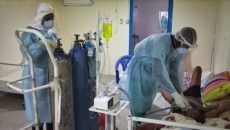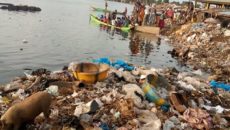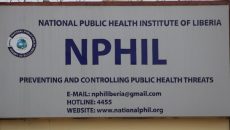In a context where 60 percent of the population is under 35, young people are critical to Liberia’s response to the COVID-19 pandemic and the country’s capacity to recover and build resilience post-outbreak.
Like many of the general population, young people are dealing with poor access to critical public services such as healthcare, water and sanitation, adequate housing and social protection. Less than 70 percent of Liberia’s youth have access to secondary or tertiary education, or formal job training resulting into high unemployment.
A high number of war-affected youths (including child soldiers) missed years of education during the Liberian civil war and some have never had a chance to catch up, leaving them with inadequate levels of literacy and skills needed to secure decent work. As such, many young people have resorted to working odd jobs, transportation services, or street vending to earn a living, pay for their education, and take care of their families. The majority of sex workers are also young people who engage in transactional sex for their livelihood.
The closure of schools in Liberia means many young people are losing on much-needed learning time. Liberia already has the highest rate of out-of-school children with 62 percent of children out of primary schools, according to UNICEF. In addition, many students are ‘at-risk’ of dropping out of school, including students of low-income households, overage students, children with disabilities, and those affected by one or a combination of factors such as poor teacher attendance, overcrowding, sexual violence, or the long commute to schools.
While the Ministry of Education has instituted a radio learning program and e-learning platform, many families are without access to electricity or internet and resources (radios, computers, etc.) to utilize these services. Very few institutions (primary and high education) have also transitioned to online education and others are yet to provide support to students.
Although the extended closure of schools will affect education generally, young women and girls will be particularly impacted due to gender norms and cultural beliefs and practices that promote a lower socio-economic status than their male peers and now increased gendered tasks at home (i.e. caring for family members and house chores).
Schools have also provided essential social safety nets for women and girls and a temporary reprieve from recruitment into traditional societies. Extended closures could likely mean more girls recruited into traditional societies and entered into early marriage. The 2014 Ebola outbreak also demonstrated that multiple forms of sexual and gender-based violence are exacerbated during crises, including trafficking, sexual exploitation, violence, and abuse.
Furthermore, lockdowns and movement restrictions create barriers for young people to access sexual and reproductive health services. For young women, in particular, reduced access to these services may lead to an increase in unplanned pregnancies or unsafe abortions. Economic stress due to COVID-19 may also result in more transactional sex work or expose young people to exploitation and unsafe sex, and consequently increased incidences of sexually transmitted diseases or HIV infections.
At street vending and small local markets where young people dominate, social distancing measures are challenging to adhere to or nonexistent. Supermarkets, pharmacies, and some building materials stores have remained open but many small to medium enterprises such as beauty salons, clothing stores, and entertainment centers have been closed for months. Very few of these enterprises have pivoted to using technology to continue their businesses. They are now at the risk of collapse. Loss of income may lead to food insecurity, high substance abuse, psychosocial and mental health need, or homelessness among young people. With Liberia was already facing a youth employment crisis, the effects of COVID-19 are an unwanted addition to this burgeoning challenge.
Recommendations
Meet Young People Where They Are: Targeted awareness and education on COVID-19 including prevention information, emerging trends, and youth-specific risks to help in dismantling myths and disinformation among young people. Utilize mediums that young people frequent – art, music, comedy, social media, popular radio programs – and influencers they follow to help bridge information and trust gaps. Awareness should integrate information on mental health and psychosocial support, and anti-substance abuse.
Promote Youth Leadership in Crises: Young people are the best representatives of their needs. Collaboration with young people and their organizations/movements will enhance young people’s trust in the government’s response efforts and reduce youth-related risks. Take into consideration intersecting factors – age, gender, sexual orientation, ethnicity, religion, and education level – to ensure interventions are responsive to the diverse needs, constraints, and aspirations of young people across the country.
Increase Access to Comprehensive Youth-friendly Sexual and Reproductive Health Information and Services: Young people must continue to benefit from access to sexual and reproductive health information and services including sexually transmitted infections and HIV prevention, treatment and support, and timely maternity care. For the long term, existing commitments – i.e. the Maputo Plan of Action which guides the African Union States on sexual and reproductive health and rights policy framework – should be implemented to ensure universal access to comprehensive sexual reproductive health services. More political and financial support needed to ensure the availability and accessibility of sexual and reproductive health commodities, institution of Comprehensive Sexuality Education in schools, and the reduction of unsafe abortion (including access to post-abortion care) and an end to Female Genital Mutilation, long-standing issues affecting girls and young women in Liberia.
Prevention of Sexual and Gender-Based Violence and Support to Survivors: Prevention should be an essential part of the national response. This includes anti-sexual and gender-based violence messaging in community engagement efforts and protocols for reporting cases and appropriate survivor-centered case management. Resources (staffing, supplies, and funding) to one-stop centers and safe homes should be increased, and adequate recovery and reintegration programs in place for survivors and other vulnerable children. The Ministries of Gender, Health, and Internal Affairs should also develop appropriate community-led interventions to address the psychosocial needs of survivors, orphans, and at-risk youth.
Safeguard Right to Education: The government needs to be more proactive and engage education providers – public and private – with clear directives to address the long-term impact of school closures on the current academic year and avoid further disadvantaging Liberian students. The current distance learning programs such as radio programs should be accessible across the country and alternatives provided for students. In consideration for schools’ reopening, reintroduce Safe School Protocols (the establishment of handwashing stations, school safety committees, and fever monitoring teams) and other infection control mechanisms. Targeted social mobilization and community engagement to protect girls’ rights should be in place to monitor issues of early marriage and operations of traditional schools and prevent the further expansion of the gender inequality gap.
Expand Universal Social Protection for Young People: Social protection is a vital policy tool to reduce inequality and social exclusion and can be most effective in tackling the multiple disadvantages faced by young people, especially those experiencing poverty, living with disability, and or highly vulnerable to COVID-19 and lockdown measures. In the immediate term, the government and stakeholders must consider food distribution and or cash transfers to meet food security, housing and medical needs, and mitigate income loss. A recovery plan should focus on strengthening youth resilience, as outlined in the National Youth Policy and the Pro-poor Agenda for Prosperity and Development, specifically Pillar 1, which aims to empower Liberians with the tools to gain control of their lives through more equitable provision of opportunities in education, health, youth development, and social protection to enable the government to make significant progress on youth development.
Invest in Youth Entrepreneurship: The government must, again, ensure the existing commitments within its development plan (i.e. Pillar II – Economy and Jobs) and the implementation of the National Youth Policy are intensified. Despite the risks of a global recession from COVID-19, it also offers a unique opportunity to review and revise economic policies and programs that Liberia has been following for the past decade. Recovery plans should place attention on small and medium enterprises. Furthermore, investment in an inclusive youth-led entrepreneurial revolution can create opportunities in sectors such as agriculture and related value chains. Youth-led agriculture enterprises, in particular, not only help to boost local food production but also provide sustainable job opportunities for young people. However, enabling agriculture policies are needed to support young people, especially youth in rural areas, to access land, storage, credit facilities, and relevant value addition skills and tools. Additional provisions should include reduced cost of land transfer, youth-sensitive land redistribution, and youth-focused administration of communal or government land.
Featured photo by Adam Parr/USAID



